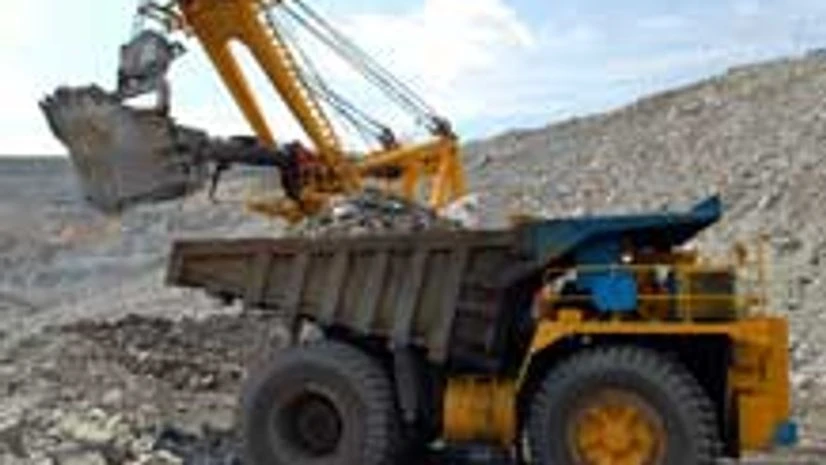Ore-starved steel mills and mining companies have welcomed the Karnataka government’s application in the Supreme Court seeking permission to allow mining to a limited extent and period to meet the present shortfall of iron ore.
“The production capacity of the operating and about-to-be-operated mines be increased temporarily for two years in 2013-14 and 2014-15 is a good move from the state government. The mining industry welcomes the state government’s proposal as well as its move to allot new leases,” Basant Poddar, senior vice chairman, Federation of Indian Mineral Industries (FIMI), said.
He said, the production of an additional 10 million tonnes, apart from the existing capacity of 30 million tonnes allowed by the Supreme Court, would be beneficial to both the mining and steel industries.
The Karnataka government, in an interlocutory application filed before the Supreme Court on November 23, 2013, stated that the demand for iron ore from various industries is around 40 million metric tonnes (MMT) per annum at present which will increase in the next two years.
The Category A and B mines with the approved capacity are not going beyond 27 MMT and the Category C mines may give 5.4 MMT only when they are disposed and made operational. Though the Supreme Court has allowed action as per the Act and Rules on the pending and fresh applications, no decision is being taken because of the 30 MMT ceiling per year.
The government stated that in 2013-14, only 18.118 MMT will be produced and 22.18 MMT in the next year. Hence, there is a need to increase the capacity temporarily for two years and this will not affect the intergenerational equity as the limit of 30 MMT per year is not exceeded.
“The state government may be allowed to process the applications and execute fresh lease deeds for a total quantity of 10 MMT for the time being. Since the production from these fresh leases will take two years, the permission of the Court is prayed so that the scarcity of iron ore arising in the next few years can be met with,” the government said in its application.
The Apex Court has posted the hearing in the matter to December 9, 2013.
Till now, only 15 mines (12 from Category A and 3 from Category B) with a combined capacity of 5.72 million tonnes per annum have restarted their operations.
Welcoming the government’s move, R K Goyal, managing director, Kalyani Steels, said: “It is a welcome move that the state government has filed an application in the SC asking for increasing the cap on production. The government should immediately take measures to give permission for new leases as well as for prospecting new mines.”
He said, presently, only 15 million tonnes of iron ore is available as against 35 million tonnes for steel mills in the state and operating at 70 per cent of their capacities. The existing operational mines should be allowed to increase their capacities immediately so that the steel industry will get a better supply of raw material, he added.
“The production capacity of the operating and about-to-be-operated mines be increased temporarily for two years in 2013-14 and 2014-15 is a good move from the state government. The mining industry welcomes the state government’s proposal as well as its move to allot new leases,” Basant Poddar, senior vice chairman, Federation of Indian Mineral Industries (FIMI), said.
He said, the production of an additional 10 million tonnes, apart from the existing capacity of 30 million tonnes allowed by the Supreme Court, would be beneficial to both the mining and steel industries.
The Karnataka government, in an interlocutory application filed before the Supreme Court on November 23, 2013, stated that the demand for iron ore from various industries is around 40 million metric tonnes (MMT) per annum at present which will increase in the next two years.
The Category A and B mines with the approved capacity are not going beyond 27 MMT and the Category C mines may give 5.4 MMT only when they are disposed and made operational. Though the Supreme Court has allowed action as per the Act and Rules on the pending and fresh applications, no decision is being taken because of the 30 MMT ceiling per year.
The government stated that in 2013-14, only 18.118 MMT will be produced and 22.18 MMT in the next year. Hence, there is a need to increase the capacity temporarily for two years and this will not affect the intergenerational equity as the limit of 30 MMT per year is not exceeded.
“The state government may be allowed to process the applications and execute fresh lease deeds for a total quantity of 10 MMT for the time being. Since the production from these fresh leases will take two years, the permission of the Court is prayed so that the scarcity of iron ore arising in the next few years can be met with,” the government said in its application.
The Apex Court has posted the hearing in the matter to December 9, 2013.
Till now, only 15 mines (12 from Category A and 3 from Category B) with a combined capacity of 5.72 million tonnes per annum have restarted their operations.
Welcoming the government’s move, R K Goyal, managing director, Kalyani Steels, said: “It is a welcome move that the state government has filed an application in the SC asking for increasing the cap on production. The government should immediately take measures to give permission for new leases as well as for prospecting new mines.”
He said, presently, only 15 million tonnes of iron ore is available as against 35 million tonnes for steel mills in the state and operating at 70 per cent of their capacities. The existing operational mines should be allowed to increase their capacities immediately so that the steel industry will get a better supply of raw material, he added.

)
